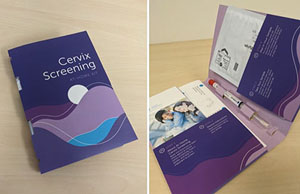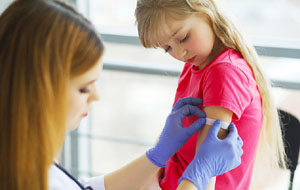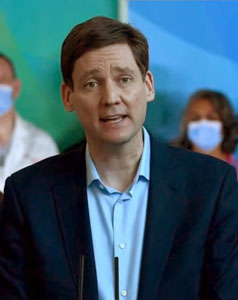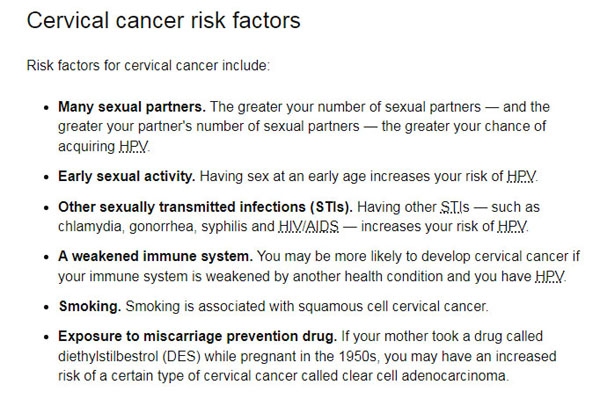Friday February 24, 2023 | VICTORIA, BC [Updated 5:25 pm]
by Mary P Brooke, B.Sc. | Island Social Trends
BC is taking an aggressive approach toward the goal of eliminating cervical cancer over the next 10 years.
As part of a broader cancer funding announcement today by Premier David Eby and Health Minister Adrian Dix, some details about advancing the program against cervical cancer were provided. They rolled out an additional $440 million in base funding, part of which includes a campaign to wrestle cervical cancer to the ground.
According to ministry sources, there is a global goal to eliminate cervical cancer. Indeed, in May 2018 the World Health Organization announced a global call to action towards the elimination of cervical cancer, underscoring renewed political will to make elimination a reality, and called for all stakeholders to unite behind this common goal. With that action, the World Health Organization says cervical cancer can be eliminated as a public health problem within a generation.
“Cervical cancer is almost entirely preventable and regular screening is one of the key ways you can prevent it,” said Dr. Dirk van Niekerk, medical director, Cervix Screening, BC Cancer, when a cervical cancer home-testing pilot project was announced in BC in 2021.
Shift from Pap test to at-home testing:
Cervical cancer has been primarily tested for and diagnosed through Pap tests, which require the time and resources of doctors or clinics as well as labs.
In the footsteps of a pilot project for home-testing for cervical cancer, there will be a shift to at-home testing for the HPV virus which is thought to be the leading base cause of cervical cancer.
In December 2021, BC Cancer announced their launch of an at-home cervix screening pilot to improve access to screening and help prevent cervical cancer. The pilot was done in Central Vancouver Island (Parksville, Qualicum Beach, Lighthouse Country, Coombs, Errington, and Nanoose Bay, and Port Alberni) and the Sunshine Coast (Earl’s Cove, Langdale, Madeira Park, Pender Harbour, Sechelt, Robert’s Creek, and Gibsons) including “improving access to screening and helping to prevent cervical cancer”.
In that initial announcement in 2021, Health Minister Adrian Dix said: “With at-home screening, people in need of cervix screening will face fewer barriers which may include cultural issues, trauma, inconvenient clinic hours, transportation concerns, and the need for time-off work or child care.”
At-home cervix screening is quick and easy. This test is done instead of a Pap test which requires medical skill to administer and for most women is considered an invasive experience. The standard line from the doctor or nurse that a Pap test is “just a little pinch” but that minimizes what most women feel and/or experience.
With at-home cervix screening, participants are mailed at-home kits with everything they need to self-screen for high-risk HPV by collecting and mailing back a sample.
One in 530 women die of cervical cancer:
Up to now, cervical cancer has been considered one of the most lethal forms of cancers, which has shortened many women’s lives and in turn impacted families in their sphere.
According to BC Health (as announced back in Dec 2021), one in 170 females is expected to develop cervical cancer during their lifetime and one in 530 females is expected to die of cervical cancer.
Today BC Health provided this statistic: “In 2021, more than 30,000 people in B.C. were newly diagnosed with cancer and more than 11,000 died because of cancer.”
HPV vaccination in BC:
For about 20 years now, vaccination in BC against the HPV virus has been offered to girls at approximately age 11 (when in Grade 6), using the Gardasil9 vaccine product. Immunize BC outlines about HPV that the vaccine, saying the vaccine works best at a young age:
- Protects against 7 types of HPV that cause about 90 percent of cervical cancers and several other cancers, such as cancers of the anus, mouth and throat, vagina, vulva, and penis.
- Protects against 2 types of HPV that cause about 90 percent of cases of genital warts.
The dosage regimen, according to Immunize BC:
- Children who get the vaccine in Grade 6 need two (2) doses at least 6 months apart.
- Children who start the HPV vaccine series on or after their 15th birthday need three (3) doses over 6 months.
The manufacturer of the Gardasil9 vaccine is available to women age 18 to 45 years, with their promo saying that “HPV vaccination is NOT just for kids. You can get the virus at any point in your life while sexually active.” More broadly they also recommend the vaccine for ages 9 to 45, both male and female.
Notable focus on women’s health:
Today’s BC Health announcement of shifting from Pap tests to at-home testing for HPV/cervical cancer is a significant shift in the overall health care paradigm to focus on a disease that impacts women.
“We’re going to continue to do things differently in BC,” said Premier David Eby today, regarding his government’s approach to health care funding and cancer care funding in particular. He make a quick reference to losing one of his female cousins to cancer about 26 years ago.
“Nearly every British Columbian has been affected by cancer in some way, through their own diagnosis or that of a family member or friend,” said Premier Eby in today’s BC Government news release B.C. launches action plan to better detect, treat, prevent cancers.
Over the last 50 or more years many proactive advancements in health missions — other than breast cancer — have been around illnesses that impact men and/or have used statistics and approaches tested on or directed at men.This has been recognized in recent years with evident shifts like public education campaigns as to how heart attack symptoms present differently in women than in men.
The Mayo Clinic on HPV says that HPV test is available only to women; no HPV test yet exists to detect the virus in men, says the Mayo Clinic. However, they point out that men can be infected with HPV and thereby pass the virus to their sex partners. This would indicate a need for public health messaging to men as to their incidental impact within the spectrum of the cervical cancer disease.
Cervical changes can take up to 10 years:
“Routine use of the HPV test under age 30 isn’t recommended, nor is it very helpful,” says the Mayo Clinic.
“HPV spreads through sexual contact and is very common in young people — frequently, the test results will be positive. However, HPV infections often clear on their own within a year or two,” according to the Mayo Clinic.
According to Mayo, cervical changes that lead to cancer usually take several years — often 10 years or more — to develop. For these reasons, they recommend a course of watchful waiting instead of undergoing treatment immediately.
Risk factors for cervical cancer:
According to the Mayo Clinic, risk factors for cervical cancer include many sexual partners, early sexual activity, other sexually transmitted infections (STIs), a weakened immune system, smoking, and exposure to a miscarraige prevention drug (DES) that was given to some women in the 1950s.
Screening more accurate than Pap test:
“Screening for HPV has been demonstrated to be a more accurate cervix screening test than the Pap test,” said Dr. Gina Ogilvie, affiliate scientist, BC Cancer and one of Canada’s leading experts on HPV.
“Pap testing detects changes to the cells of the cervix that have been caused by HPV. Whereas, HPV testing detects the presence of high-risk types of HPV, often before cells changes have occurred, identifying people at risk for cervical cancer, earlier and better.”
This initiative aligns with the World Health Organization’s call to eliminate cervical cancer. Funding for the pilot project was provided by the Canadian Institutes of Health Research (CIHR) and the Canadian Partnership Against Cancer. Today’s new BC funding toward cancer management and cures is taking the next step.
===== ABOUT ISLAND SOCIAL TRENDS:
Island Social Trends covers the news of south Vancouver Island and British Columbia, which a focus on socioeconomic trends including in health and education. Archives include: POLITICS | EDUCATION | HEALTH
The editor and publisher of Island Social Trends is Mary P Brooke, who founded the series of publications that is presently published daily at islandsocialtrends.ca. (Formerly as print publiations: MapleLine Magazine 2008-2010, Sooke Voice News 2011-2013, and West Shore Voice News 2014-2020).
Ms Brooke has been covering politics, business, education and communities through a socioeconomic lens since 2008 on south Vancouver Island. She followed and wrote extensively about the COVID pandemic during 2020-2022 (see COVID archive).
Among other qualifications, Ms Brooke holds a B.Sc. in health sciences and a Certificate in Public Relations.
ARCHIVES: POLITICS | EDUCATION | HEALTH | COVID
HOW TO SUBSCRIBE to ISLAND SOCIAL TRENDS: Free ENEWS | Premium Subscriber/Sponsor












